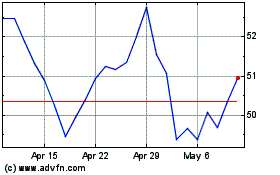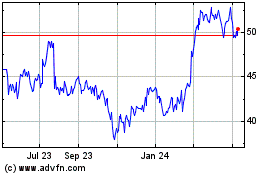PayPal Strikes Deal with MasterCard to Allow Payments in Stores
September 06 2016 - 7:30AM
Dow Jones News
PayPal Holdings Inc. has struck another deal with a payments
network, this time MasterCard Inc., as it seeks to carve out a
foothold in stores, according to the company.
This follows its big deal with Visa Inc. earlier this year. The
two deals in quick succession are among the biggest moves so far in
the online-payments pioneer's post-independence strategy after
splitting off from eBay Inc. last year.
The aim is to end bitter fights with the big card issuers and
make PayPal a universally accepted method of payment. This would
include in stores at the checkout counter, with MasterCard and
Visa's mobile-tap tools, the big new frontier for payments
companies.
But some analysts have argued that this comes at the expense of
profitability in the short term. The moves shift PayPal away from
promoting free bank transfers to fund customers' transactions and
toward the networks, which charge a fee.
There is also fierce competition from tech firms such as Apple
Inc., and young payments providers such as Stripe Inc., to win over
merchants and consumers in big numbers in the mobile and one-click
online payments realms.
PayPal's stock tumbled as much as 9% after the Visa deal was
announced in July, putting the company on the defensive about its
strategy. Its shares are still down 8% from the highest close that
month, though overall they remain up 7% from the company's debut in
July 2015.
The company has said the network deals, which will see PayPal
place debit and credit cards on par with other ways to pay, make
PayPal a "ubiquitous" payment tool. It argues that volume growth
would outpace declines in revenue per transaction, and that
merchants would want to pay for PayPal because it works seamlessly
for every customer.
The deals would also help its relatively newer services, such as
Braintree, which processes payments for big merchants, and Venmo, a
social peer-to-peer payments app popular with millennials.
"Customer choice and partnership are fundamental principles for
PayPal," Chief Executive Dan Schulman said in a statement. "With
each partnership agreement that we sign, we further expand the
ubiquity and value of the PayPal brand and improve our own
economics."
The company is in discussions with banks that issue cards to
potentially create new products and promote PayPal via those
partnerships, people familiar with the talks said.
Those deals could be crucial as well. Apple already offers a
mobile wallet and will soon be rolling out an online payment tool,
PayPal's bread-and-butter. Big banks are also preparing to roll out
their new Venmo competitor app, set to be called Zelle.
The terms of the MasterCard deal have PayPal enabling users to
set the credit or debit card as a default payment method. PayPal
will also share data on any transactions that use the MasterCard
mobile tap.
"Whether paying in the physical or digital world, consumers want
to see the familiar MasterCard brand," said MasterCard CEO Ajay
Banga in a statement.
In exchange, MasterCard will drop the digital wallet fee it
charges PayPal. It will also give PayPal volume discounts, as Visa
did.
MasterCard will further enable PayPal's Braintree to offer
Masterpass, a one-click online checkout tool, and enable Venmo
users to make instant transfers via MasterCard Send, rather than
waiting up to three days to get money into their bank accounts.
That in particular is key to competing with banks' real-time
payments apps.
Write to Telis Demos at telis.demos@wsj.com
(END) Dow Jones Newswires
September 06, 2016 07:15 ET (11:15 GMT)
Copyright (c) 2016 Dow Jones & Company, Inc.
eBay (NASDAQ:EBAY)
Historical Stock Chart
From Mar 2024 to Apr 2024

eBay (NASDAQ:EBAY)
Historical Stock Chart
From Apr 2023 to Apr 2024
